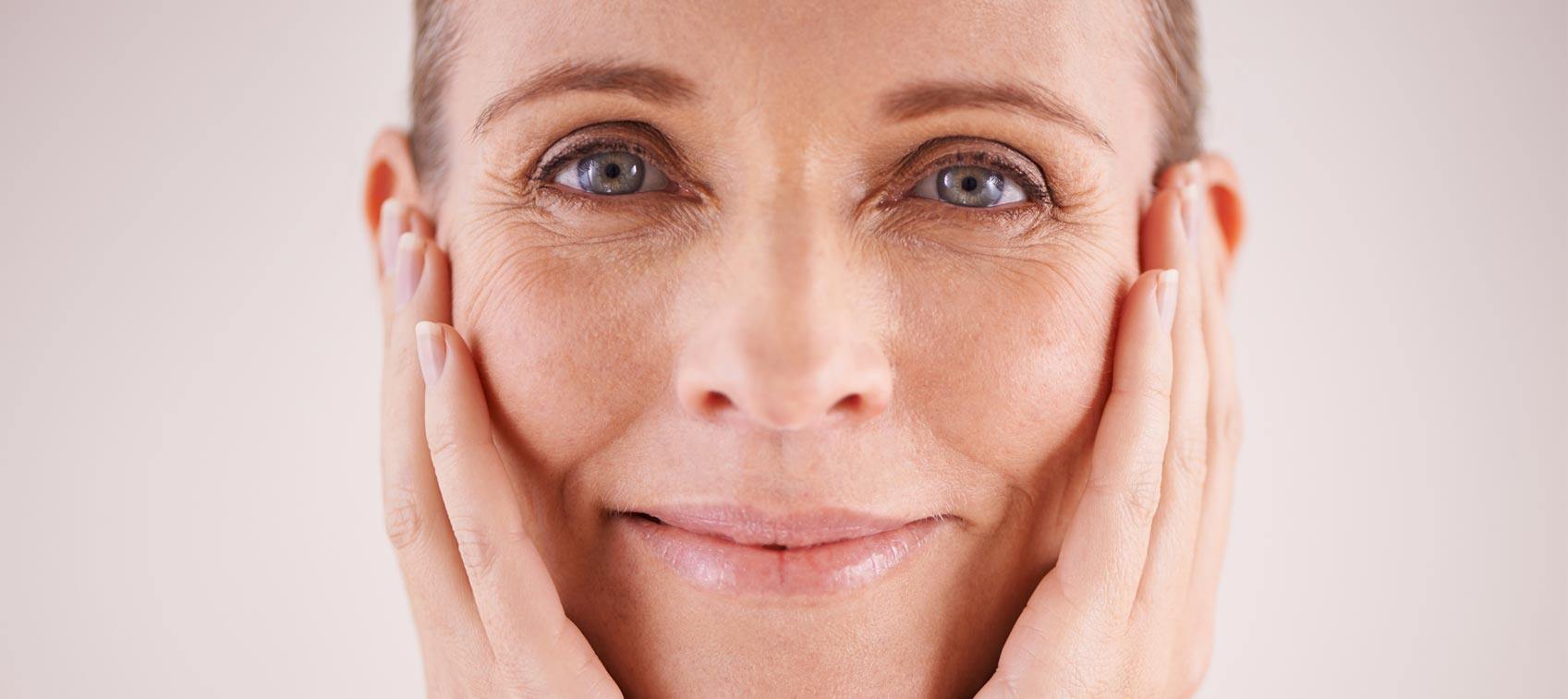
Do you ever look in the mirror and marvel at the old person looking back at you? You may have the energy and endurance of a 30-year-old, but skin bears witness to the march of time.
Most of the visible changes are due to a decline in collagen, the fibrous protein in the dermis that structurally supports and nourishes the outer epidermis. Free radical damage, inflammation, and other degenerative processes reduce the fibroblasts’ ability to produce new collagen while increasing the activity of collagen-degrading enzymes. As the underlying scaffolding deteriorates, the skin thins, sags, puckers, and wrinkles.
The dermis also loses elastin (a protein that allows skin to resume its shape after being stretched) and hyaluronic acid (which holds water and hydrates the skin), and the turnover of cells on the skin’s surface slows. Loss of facial fat and muscle tone plus a lifetime of sun exposure and environmental insults also contribute to skin aging.
You can’t turn back the clock, so what can you do to get younger-looking skin?
You could have a cosmetic procedure, like the approximately 15 million Americans do every year. Some of these were surgeries on the eyelids, nose, brow, or entire face, and breast or buttock augmentations. (Butt lifts, implants, and fat grafting are among the fastest-growing procedures.) But nearly 14 million were minimally invasive Botox injections for forehead furrows and crow’s feet, hyaluronic acid and other fillers for lines around the mouth and bags under the eyes, and laser treatments, chemical peels, or microdermabrasion for age spots, fine lines, and skin tone and texture.
Some people belittle such procedures, and I agree that our culture places too much emphasis on beauty and youth. However, it’s normal to care about how you look and to desire younger-looking skin. Although I wouldn’t necessarily encourage anyone to go this route, if you feel it would improve your confidence and self-esteem, I say go for it. Although surgery is a big step that shouldn’t be taken lightly, minimally invasive cosmetic procedures are quite safe. In a 2015 study involving 20,399 procedures performed by experienced dermatologists, adverse events occurred in less than 1 percent, and most were minor and transient.
5 Tips for Younger-Looking Skin
Beyond that, here’s what you can do at home to achieve younger-looking skin.
Protect Your Skin From the Inside Out. For younger-looking skin, what you put in your body is as important as what you put on it. Smoking and excess alcohol make you look old long before your time. A healthy diet is obviously important and should include green tea, flavanol-rich cocoa, brightly colored fruits and vegetables, fish, nuts, and seeds, which are particularly good for the skin.
On the supplement front, start with a daily multivitamin with robust doses of vitamins A, C, D, E, and zinc. If dry skin is an issue, consider omega-6 oils (borage, evening primrose, and black current seed). An inflammation-curbing omega-3 supplement is also recommended—and if you make it krill oil, you’ll get the added benefit of astaxanthin.
Astaxanthin is an exceptionally potent antioxidant with numerous therapeutic uses. When the skin is exposed to UV radiation, it sets off a chain reaction of free radical and singlet oxygen damage that dramatically accelerates skin aging. Astaxanthin accumulates in all layers of the skin, where it acts as an internal sunscreen by neutralizing these harmful molecules before they can do any damage.
Because oxidative stress curtails collagen synthesis, this carotenoid also improves the appearance of damaged skin. Studies have shown that taking 6 mg of astaxanthin a day for six to eight weeks resulted in measurable reductions in crow’s feet wrinkles and age spots, along with increases in elasticity, texture, and moisture content.
Apply Antioxidants Topically. When applied topically, antioxidants protect the skin and promote collagen production, which results in younger-looking skin. Retin-A, a prescription vitamin A derivative and one of the best-studied ingredients, increases skin cell turnover and collagen synthesis. Over-the-counter antioxidants, including retinol (a weaker form of vitamin A), vitamin C, and plant-based antioxidants are also effective. Hyaluronic acid (HA) helps with skin hydration because it retains hundreds of times its weight in water.
Use Alpha Hydroxy Acids. You can stimulate growth of new epidermal cells—the most superficial layer of skin—with alpha hydroxy acids (AHAs). These are natural substances that stimulate old cells to shed more rapidly, revealing younger-looking skin beneath the surface. They also increase the number of glycosaminoglycans—complex molecules that help skin retain moisture. By applying an AHA cream or lotion each night, you’ll give your skin a fresher appearance and reduce fine lines and wrinkles.
Use a Moisturizer. An easy way to keep your skin hydrated is to use a moisturizer. In addition to soothing your skin, a moisturizer will produce immediate results in your appearance, smoothing out fine lines and wrinkles and plumping up the skin. Most any oil or lotion will help seal in moisture—you can even use olive oil. You want to apply it in the morning and again at bedtime for younger-looking skin.
Drink Water. Seventy percent of the dermis—the inner layer of the skin—is water. One of the main reasons our skin sags and wrinkles as we age is that the dermis loses about 30 percent of its total water content. The result is flat, dry-looking, flaking, itching skin. Moisturizers certainly help dry skin, but don’t overlook the importance of hydrating your skin from the inside by drinking copious amounts of fresh, purified water. This is vital for overall health and imperative for supple, moist, younger-looking skin. I recommend at least eight 8-ounce glasses every day.
Have Realistic Expectations
Everything we’ve discussed can, to varying degrees, promote the appearance of younger-looking skin. But let’s be honest. A 70-year-old is never going to look 30. I hope you’ll get great results from some of these suggestions, but heed this sage advice from Ellen DeGeneres: “Beauty is about being comfortable in your own skin. It's about knowing and accepting who you are."


